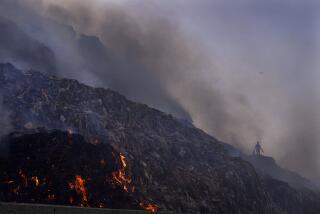HUNGER : Food Output Fell in ‘91--Famine Threat Grows
- Share via
ROME — Buffeted by drought, wars and political tumult, the world’s food production dropped in 1991 for the first time in nearly a decade, accentuating grim prospects of famine in Iraq and the Horn of Africa and severe food shortages in parts of the old Soviet Union and Eastern Europe, U.N. experts report.
“The world will enter 1992 once again consuming more than it produces, and stocks will be drawn down to dangerously low levels,” Edouard Saouma, director general of the Rome-based U.N. Food and Agriculture Organization, said in a report issued this week.
Despite a rapidly expanding global population, food and agricultural production around the world dropped by 1.4% in 1991, Saouma said in the year-end message. Declines in cereal and wheat production were key to the first drop in global production since 1983, he said.
“No less than 24 nations are experiencing food shortages, some of them facing famine,” Saouma said, adding, that “as our margin of safety is reduced, our food security next year will depend to a large extent on the success or failure of the 1992 harvests.”
In a world where one person in 10 is under-fed, the situation is particularly critical in the Horn of Africa, Saouma said. Famine stalks Sudan, and the situation is grave in Ethiopia and in Mozambique farther south. But Somalia, torn by tribal strife, hurts worst of all.
Saouma estimates that 4.5 million Somalis, about 60% of the population, face starvation. FAO food experts say that violence in southern and central parts of the country make it hazardous for relief agencies to distribute supplies.
“Only a fraction of the people in Somalia can be reached, and widespread malnutrition and loss of life from starvation are evident. Health care facilities are very poor and in many places nonexistent,” said one FAO specialist.
The crisis is also great in Iraq, crippled by war and an international embargo, the FAO says. Food remains scarce, and prices are up to 20 times higher than they were before the Persian Gulf War, placing many goods beyond the economic reach of large parts of the population.
FAO experts anticipate a poor 1992 harvest in Iraq, noting that farmers hampered by the lack of spare parts for machinery managed to sow only about half of the acreage normally devoted to cereal crops.
In the meantime, the experts say, a U.N. Security Council decision to allow export of $1.6 billion in petroleum by Iraq to finance the purchase of humanitarian requirements is not yet being implemented.
FAO experts report worsening malnutrition and increased child mortality in Iraq, predicting greater hunger and poverty in coming months in a country where families are reported to be selling household goods to supplement food rations.
The FAO also anticipates tough times ahead for Eastern European countries of the former Soviet Bloc. Serious food shortages grip Romania and Albania, the FAO says, while Poland, Hungary and Czechoslovakia scramble for new markets for foodstuffs they once sold through the now-defunct COMECON trading alliance.
“In the U.S.S.R., the cereal harvest is down 25% from the bumper crop of 1990. The state marketing system is disintegrating, and with both producers and consumers hoarding supplies, food is increasingly short in urban areas,” Saouma said in his report.
Officials in Moscow warned last week of dwindling food supplies, and President Mikhail S. Gorbachev urged breakaway republics to continue their traditional supplies of foodstuffs to the Russian capital.
“Political uncertainties, the disintegration of the state distribution system, shortages of fuel in several areas and rapid inflation could lead to serious food shortages among vulnerable populations, whose numbers are increasing,” the FAO said.
To aid Eastern Europe and the disintegrating Soviet Union, Saouma called for “major injections of capital and technology and substantial food aid during this extremely risky period of transition from collectivism to market economies.”
More to Read
Sign up for Essential California
The most important California stories and recommendations in your inbox every morning.
You may occasionally receive promotional content from the Los Angeles Times.













